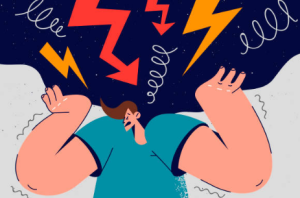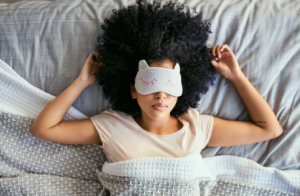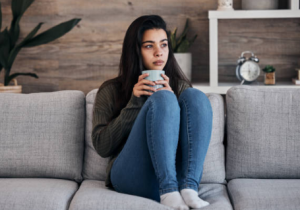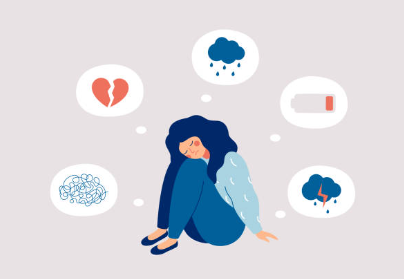Occasional feelings of anxiety or worry can be considered a normal reaction to a stressful situation. But for about 30% of U.S. adults, they have experienced anxiety at some point in their lives that are amplified to the point where they are excessive, persistent, and interfere with daily life.
This includes physical symptoms of anxiety, such as sweating, rapid heartbeat, or shortness of breath.

The root causes of anxiety disorders are complex and may stem from a combination of genetic, environmental, and psychological factors. So, while developing an anxiety disorder isn’t necessarily preventable, there are some coping strategies you can implement and seek professional help to try and manage anxiety in your daily life.
Tips for Coping with Anxiety
Certain lifestyle changes or mindfulness techniques can help manage anxiety. Fortunately, you can integrate a variety of research-based techniques to help alleviate anxiety in your daily life.
Be Positive
Not only does regular exercise help support your overall health, but it has also been shown to reduce the severity and frequency of anxiety attacks. Even just a workout can be helpful (at least temporarily).
Data shows that activities such as walking, biking, or swimming for 15 minutes a day can begin to provide short-term relief from anxiety symptoms. For more substantial, longer-term benefits, keep your workout routine consistent. This may mean at least two hours of moderate-intensity activity per week, such as brisk walking. It may also mean regular mindfulness exercise practices, such as yoga, which is believed to have anxiolytic effects.
Get Enough Sleep
Anxiety and sleep have a complex relationship. Studies have shown that anxiety can lead to sleep deprivation and vice versa – sleep deprivation triggers anxiety. Women may be particularly affected by this relationship.

To help stop this cycle, assess your current sleep habits. While adjusting your sleep habits is easier said than done, remember that getting enough sleep is essential for overall well-being, as well as improving mood and reducing stress.
Experts recommend combining one or more of the following sleep techniques to relieve anxiety symptoms:
- Maintain a consistent sleep schedule that allows your body and mind to get routine.
- Turn off your phone and TV before bed to suppress nighttime brain activity.
- Drinking a warm cup of herbal tea can help keep the body in a state of relaxation.
- Turn on some relaxing spa music to soothe the mind and possibly improve sleep quality.
Limit Alcohol and Caffeine
Substances like alcohol and caffeine can affect functions like sleep and mood, so it’s no surprise that they also have the potential to trigger anxiety. That’s why experts recommend limiting your intake of both to avoid exacerbating anxiety symptoms.
Still, when reducing your caffeine intake, be aware that you may experience some withdrawal symptoms along the way. It may be helpful to shift your focus to drinking water throughout the day and staying hydrated. Studies have found that drinking plain water can reduce the risk of anxiety and depression in adults.
Eat a Balanced Diet
What you eat affects how you feel. When it comes to anxiety symptoms, maintaining normal blood sugar levels can have a big positive impact.
Researchers have found that diets rich in processed foods, fats, and sugary foods are more likely to trigger anxiety than diets rich in lean proteins, complex carbohydrates, fruits, and vegetables.

Improvement in anxiety symptoms can be seen quickly after changing the diet. After following a balanced meal plan, some study participants reported reduced anxiety levels within a month.
Practice Self-Care
Make time for regular self-care, as this can help relieve anxiety symptoms. Self-care varies from person to person. For you, self-care may mean setting aside time for pleasurable activities and relaxation strategies, chatting with friends, getting a massage, or journaling. Cleaning up your calendar for these purposes can help improve your health.
Meditate
By clearing the mind into a state of deep relaxation, meditation and conscious deep breathing may help reduce anxiety symptoms in people with anxiety disorders.
One type of meditation that has been shown to reduce anxiety is guided mental imagery. This can also be referred to as guided meditation, imagination, mental drills, or guided self-hypnosis. Guided mental imagery often involves imagining future situations, tasks, or events in a positive way so that when it actually happens, you will feel more prepared and relaxed.
Many mental health care professionals can help guide meditation. You can even find online resources or apps that you find useful.

Try Grounding Techniques
Rooting is the process of temporarily detaching yourself from feelings of anxiety so that you can focus. While grounding won’t stop you from feeling anxious, it may help reduce the intensity of anxiety. This can help you feel safer and more in control.
There are several techniques you can use to get yourself grounded. The first one is the 333 rule, which can be used anytime and anywhere to get yourself grounded in the moment. To practice the 333 rule, do the following:
- Scan your environment and name the three objects you can see.
- Listen to your environment and say three things you can hear.
- Touch or move three objects, such as objects near you or body parts.
Another grounding technique is the 54321 method. To do this, you should determine the following in your environment:
- You can taste one thing
- There are two things you can smell
- Three things you can hear
- Four things that can be touched
- Five things you can see
When to See a Healthcare Provider for Anxiety
There is a difference between the anxiety that you may feel from time to time as a normal reaction to a particular event or situation, while the anxiety does not go away and can be a sign of an anxiety disorder.
Experts recommend keeping an eye out for some common signs. Consider contacting a healthcare provider if you find yourself with:
- Anxiety symptoms are found to be difficult to control
- I find it difficult to function in my daily life
- Excessive or frequent worry and feeling anxious
- Sleep badly, either sleeping too little or too much
- Anorexia
- Symptoms of physical anxiety, such as increased heart rate or sweating
- Feeling increasingly irritable or moody
- Difficulty concentrating
- Difficulty concentrating
Conclusion
Anxiety can be an accidental, normal response to stress. Anxiety that doesn’t go away or worsens can be a sign of an anxiety disorder. Anxiety can produce painful feelings as well as physical symptoms such as a rapid heartbeat. Fortunately, there are ways to try to relieve anxiety. This includes lifestyle changes such as exercising daily, getting enough sleep, and meditating. When you’re feeling anxious, you can also try grounding techniques like the 333 rule to keep yourself focused. If these coping skills aren’t enough, a healthcare provider can recommend a treatment plan for talk therapy, medications, or both.





